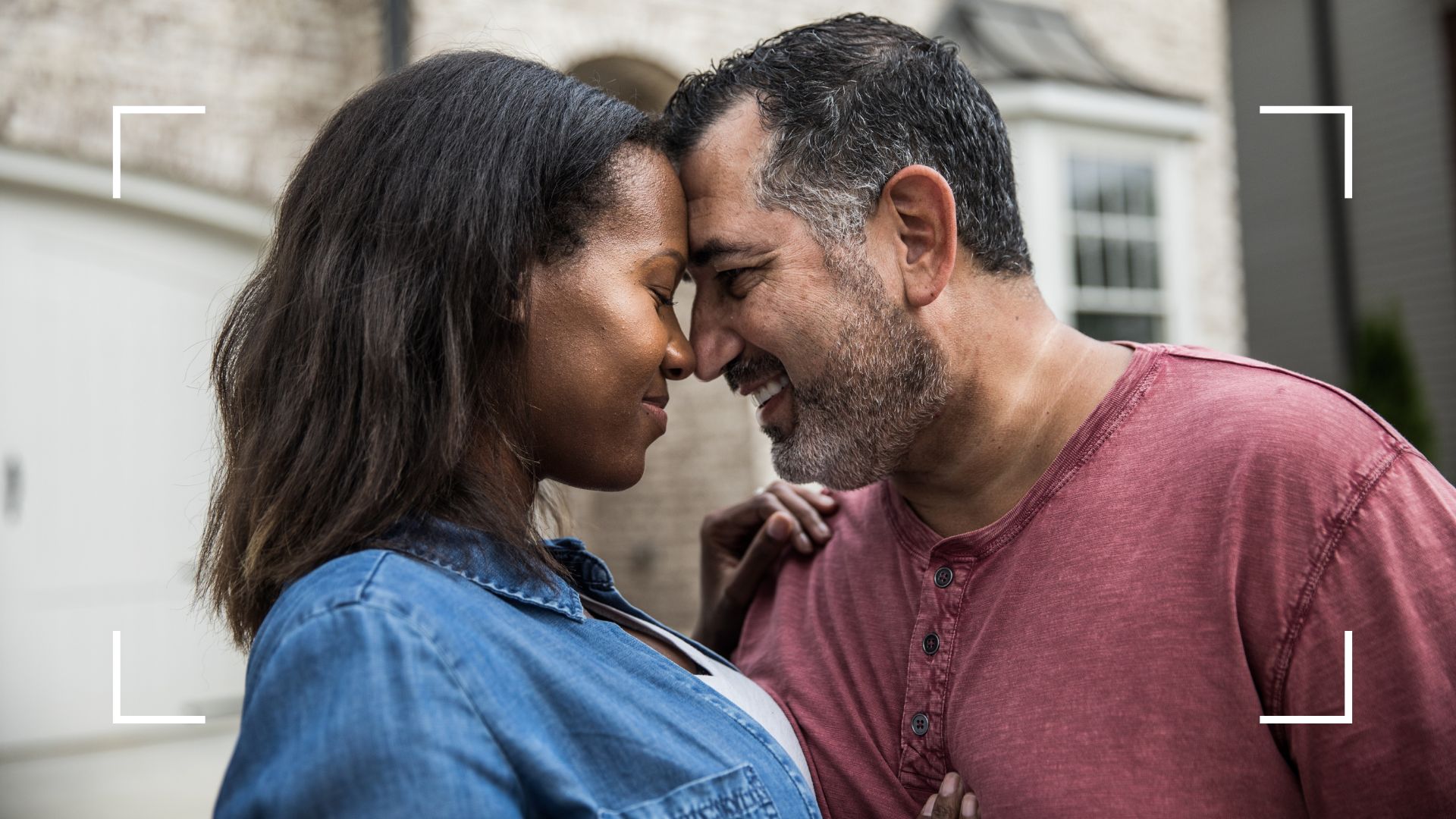How to boost libido: 8 tips for rediscovering your sex drive in a long-term relationship
A sexologist and psychologist reveal how to boost libido if yours has waned in recent years, plus why it happens in the first place


Much like other forms of desire, our libido (otherwise known as our sex drive) ebbs and flows depending on what else is going on in our lives. While it can be worrying to realise that sex with your partner has lost its appeal, the experts assure us it's entirely possible to learn how to boost libido and bring the spark back into a long-term relationship.
There are many reasons why our interest in sex can wane over the years, from short-term stressors like work and family commitments to hormonal changes and a loss of body confidence. For some who have an otherwise active sex life, these may just cause small blips and you could be back in the bedroom before you know it. But if you're noticing that your interest in sex has declined significantly - or even disappeared completely - over the years and you're not sure why, you could be dealing with a low libido.
It's entirely possible to exist without sex in a happy relationship - if that's what you want - and many people learn how to be intimate without sex very easily. However, if you want to revive your sex life and bring physical intimacy back into your relationship, we have you covered. Here, woman&home speaks to a certified sexologist and psychologist to reveal how to boost libido, why it can wane, and the key signs of low libido to look out for.
How to boost libido in long-term relationships
1. Start masturbating
While masturbation is seen as taboo by some people in relationships, with the idea that sex should be 'saved' for time together, it's one of the best ways to help women stay in touch with their bodies and hone their own pleasure.
"As our bodies change, so too does our approach to pleasure," explains clinical sexologist Megwyn White. "Having a masturbation practice gives you an opportunity to test the waters of new erogenous zones and to experiment in ways you might not feel comfortable with a partner."
There are even studies to back up White's suggestion. Studies by many, including one by the University of Grenada, reveal that masturbation is great for fostering sexual desire in long-term relationships, with those who masturbate having significantly more orgasms, greater sexual desire, higher self-esteem, and greater satisfaction sexually and in the relationship, and required less time to become aroused.
"There are many reasons for this," explains White, who is also the director of education at Satisfyer. "Firstly, masturbation as a practice helps to strengthen a connection to erogenous pathways, while giving you an opportunity to explore your erotic imagination. Additionally, at a physiological level, masturbation can help to strengthen pelvic floor muscles while also stimulating blood flow to your genitals. That means that your clitoris, vulva, and vagina are more ready and available for sexual activity with a partner."
Sign up for the woman&home newsletter
Sign up to our free daily email for the latest royal and entertainment news, interesting opinion, expert advice on styling and beauty trends, and no-nonsense guides to the health and wellness questions you want answered.
If you're looking to learn how to boost libido during menopause, this is pretty essential. "It’s so important for women to continue to masturbate as they age to keep their sexual organs healthy and vital and also to unlock a better understanding of what turns them on so that they can share that information with their partner," she adds. "This not only helps in bridging the sexual divide between you and your partner, it helps to reawaken the mystery of desire that may have been dormant over time."
2. Have some new experiences together
"Engaging in new or exciting activities can reignite the passion couples felt when they first began their relationship," says Dr Lisa Lawless, a clinical psychologist with expertise in relationships, couples counselling, and sexual health.
"You could try a new hobby, take a trip or even attend a class together," says Lawless, who is also the CEO of Holistic Wisdom. "Creating a sense of novelty can produce those butterflies again. It's not about how lavish the date is though but the quality of time spent together."

3. Adapt to your body's natural changes
As much as masturbation can help you learn how to spice things up in the bedroom, it's important to know that things might be changing totally outside of your control. Reaching the 40s means that, for some, the symptoms of menopause are on the horizon.
When it comes to learning how to boost libido during this time, it's important to work with the changes rather than against them. For example, many people find that using lube works wonders as the drop in oestrogen levels can sometimes cause vaginal dryness, which can make sex uncomfortable - or even painful. It's a simple addition that makes a world of difference.
"This is a normal part of life influenced by factors like hormones and metabolism shifts," says White. "It's important not to criticise yourself for these changes but instead to shift your focus to health and strength, rather than fixating on numbers."
4. Focus on responsive desire
Most of us will be at least somewhat familiar with the feeling of spontaneous desire with our partners - when arousal comes in an instant. It feels intense and often overwhelming. It's that 'I have to have you now' feeling, and as White explains, "this type of desire is very common in the early stages of a relationship when things are fresh and new."
However, she says, it's much more common for women to experience responsive desire, especially as the relationship continues. "This type of desire requires some type of physical touch to get the energy of desire flowing. It can come in the form of a sensual massage or even on a date in which you and your partner share a romantic meal. Responsive desire teaches us that it's not about being in the mood, it's about creating the conditions for eroticism to flow."
5. Re-establish intimacy in your relationship
The brain is known as the 'most powerful sexual organ' for a reason: our libido and our mental and emotional wellbeing are completely intertwined. So, if you're having problems in your relationship or aren't feeling content with your situation, you're unlikely going to want to have sex.
"Sometimes, because of the daily grind, we lose touch with our partners and forget how to touch one another intimately without sex," says Dr Lawless. "Often, couples who only touch one another when it comes to sex don't have as strong of physical intimacy as those who touch one another through simple acts of affection, such as holding hands, hugging, and playful touch that is not necessarily a precursor to sexual intercourse."
So, instead of focusing on the physical, it might be time to focus on emotional intimacy. "Deep conversations, couples therapy, or even simply spending time together can pave the way for a heightened libido," she says.
6. Try something new in the bedroom
When you feel ready to be sexual again with your partner, it's worth exploring new ideas and elements of your relationship you might not have considered before. For example, you might like to create a list of so-called 'bucket list' sex positions you want to try, to help each other discover new pleasure zones.
For women struggling with their libido, this can be particularly beneficial. "It's especially important for a woman to have the clitoris stimulated, which is the most critical aspect of orgasm for most women and should never be trivialized. Some sexual positions encourage contact with a partner's pelvic bone or allow for manual stimulation on the head of the clitoris," says Dr Lawless.
"Sex toys such as clitoral vibrators and air pulse stimulators are an excellent way for couples to ensure that the clitoris is stimulated throughout sexual intercourse as well," she adds. "Bluetooth apps and remote-controlled vibrators allow them to be used hands-free, and there is the added benefit of sexual health through increased blood circulation."
Looking to invest and not sure where to begin? Take a look at our tried and tested reviews of the best sex toys.

7. Take a look at your eating habits
The existence of aphrodisiacs is a hotly debated subject. Most recently, nootropics and adaptogens have been pushed into the mainstream and now, mushrooms are the new way to boost your sex drive.
However, it is true that many types of food enhance brain functioning and overall health and improve circulation, all of which have a positive effect on sexual performance. "The circulatory system plays a vital role in sexual health by providing blood to the sexual organs," explains Dr Lawless. "Therefore, incorporating such foods into your diet may improve cognitive and sexual functioning."
Some top-recommended foods to include are:
- Oysters: "Oysters, for example, have long been known to increase libido because these molluscs are rich in zinc," she says. "This is because zinc also plays a role in testosterone production, a hormone linked to sexual desire in any gender. However, zinc is also a mineral that plays a crucial role in brain function, specifically in learning, memory, and attention."
- Figs and dates: "Figs and dates also have a reputation as an aphrodisiac due to their high potassium levels (even higher than bananas). Potassium aids the circulatory system by regulating blood pressure and helping the brain learn, memorize, and other cognitive functions."
- Chocolate: "Dark chocolate is known for its romantic and aphrodisiac qualities as it improves blood flow, enhancing cognitive functioning and sexual performance," she says. "There are several compounds that may contribute to this effect, including caffeine, theobromine, and phenylethylamine."
- Avocados: "Avocados contain healthy fats and nutrients like vitamin E, which help improve brain function and reduce inflammation."
- Nuts: These are rich in omega-3 fatty acids, vitamin E, selenium, magnesium, and zinc.
8. Do some strength training
Strength training for women is a hugely underrated form of exercise for so many reasons. Whether you do classic strength training in the gym or opt for a lighter form of exercise, like Pilates for strength training, picking up some dumbbells could actually help you out in the bedroom.
As White explains: "Strength training with weights can be an excellent way to support your body's changing needs. For example, ageing often brings a decline in muscle mass, affecting the metabolism and overall strength. Incorporating regular strength training can counteract this decline, improving your metabolism, bone density, and physical capabilities."
But if lifting weights isn't for you, don't worry. "Exercise in general can help in boosting your libido, and if you really want to take it to the next level focus on exercises that encourage 'core stability' as this will help you to maintain the muscles that support orgasm." Yoga for beginners anyone?
Why is my libido so low?
Low libido is a common issue known to affect at least 26% of premenopausal women and over half (52%) of menopausal women, per research published in the Archives of Internal Medicine. While the causes vary from person to person, the main issues the experts agree often lead women to experience a waning sex drive include: hormonal changes during perimenopause and menopause, stress and fatigue related to responsibilities at home or work, relationship dynamics, communication issues, and changes in body image.
But White says the most common relationship issues in the bedroom come from a positive force: good old familiarity. "As the initial excitement of a new relationship settles, the familiarity of a long-term partnership can sometimes lead to codependency, which can ultimately impact sexual motivation," she says.
Dr Lawless agrees. "In the infatuation stage, often called the 'Honeymoon Period' of a relationship, adrenaline-like neurochemicals are released," she explains. "[Among these are] dopamine and norepinephrine, which make us feel good and stimulate the production of adrenaline. These chemicals, combined with hormonal changes, give us infatuation."
After this period of time, she says, the brain stops producing as many of these chemicals and builds a tolerance. "This is when most relationships begin to see an intensification of conflicts and a lower libido."
Signs of a low libido
- You just don't want to have sex: This is perhaps the most obvious sign of low libido: a complete lack of interest in having sex with your partner, even if you're still heavily invested in the romantic element of the relationship. "You may find yourself less emotionally and physically responsive in the bedroom and this can often impact your self-esteem and intimacy with your partner," says White.
- You struggle to get physically aroused: While a splash of your best lube is useful in all sexual situations, if you find yourself almost unable to get physically aroused, Dr Lawless says you could be struggling. "When you find it harder to get physically aroused or feel emotionally distant during intimate moments, even with adequate stimulation, it indicates low libido," she says.
- Thinking less and less about sex: "As we get older and our bodies change our priorities can change along with it," explains White. "You may find yourself more focused on your career and your family over what’s happening or not happening in the bedroom. It’s important to pay attention to what your priorities are, and when you might be ignoring connection with your partner."
- You don't feel turned on like you used to: "You may find that what once turned you on doesn’t anymore. This is often not related to our partners but more related to the fact that our bodies and minds are changing and may simply require a different approach," says White.
- You have fewer sexual fantasies: "This is incredibly common in long-term relationships," explains White. "You may have once had a vital and active erotic imagination, especially at the early stages of your relationship or when you were single and dating. It's important to re-explore this erotic imagination via literature, novels, and audio erotica."
- You feel tired all the time: It's no secret that our bodies slow down as we age. Our sleep patterns and energy levels are often one of the first things to age, and this can negatively impact our libidos, explains White. "This is again why it's important to stay physically active, as it will naturally keep the blood flowing to all the right places."
Does a low libido mean the end of a relationship?
Not at all, sex doesn't have to be important in a relationship if you don't want it to be. As Dr Lawless says, "Happiness is not based on whether or not you have sex and couples who don't have it often or at all may still feel satisfied in their relationship and have physical intimacy."
However, what is important is agreement. "If both partners are content and satisfied with their sex lives in whatever form and frequency it manifests, it can be considered healthy. When it leads to dissatisfaction or emotional pain, partners should explore ways to improve their situation."
She continues, "What is most important for couples is their sense of intimacy and connection. Every partnership is unique, and as long as things in the relationship are consensual and do not cause harm, it is not about what is good or bad but what is suitable for the couple."

Grace Walsh is woman&home's Health Channel Editor, working across the areas of fitness, nutrition, sleep, mental health, relationships, and sex. She is also a qualified fitness instructor. In 2025, she will be taking on her third marathon in Brighton, completing her first ultra marathon, and qualifying as a certified personal trainer and nutrition coach.
A digital journalist with over seven years experience as a writer and editor for UK publications, Grace has covered (almost) everything in the world of health and wellbeing with bylines in Cosmopolitan, Red, The i Paper, GoodtoKnow, and more.